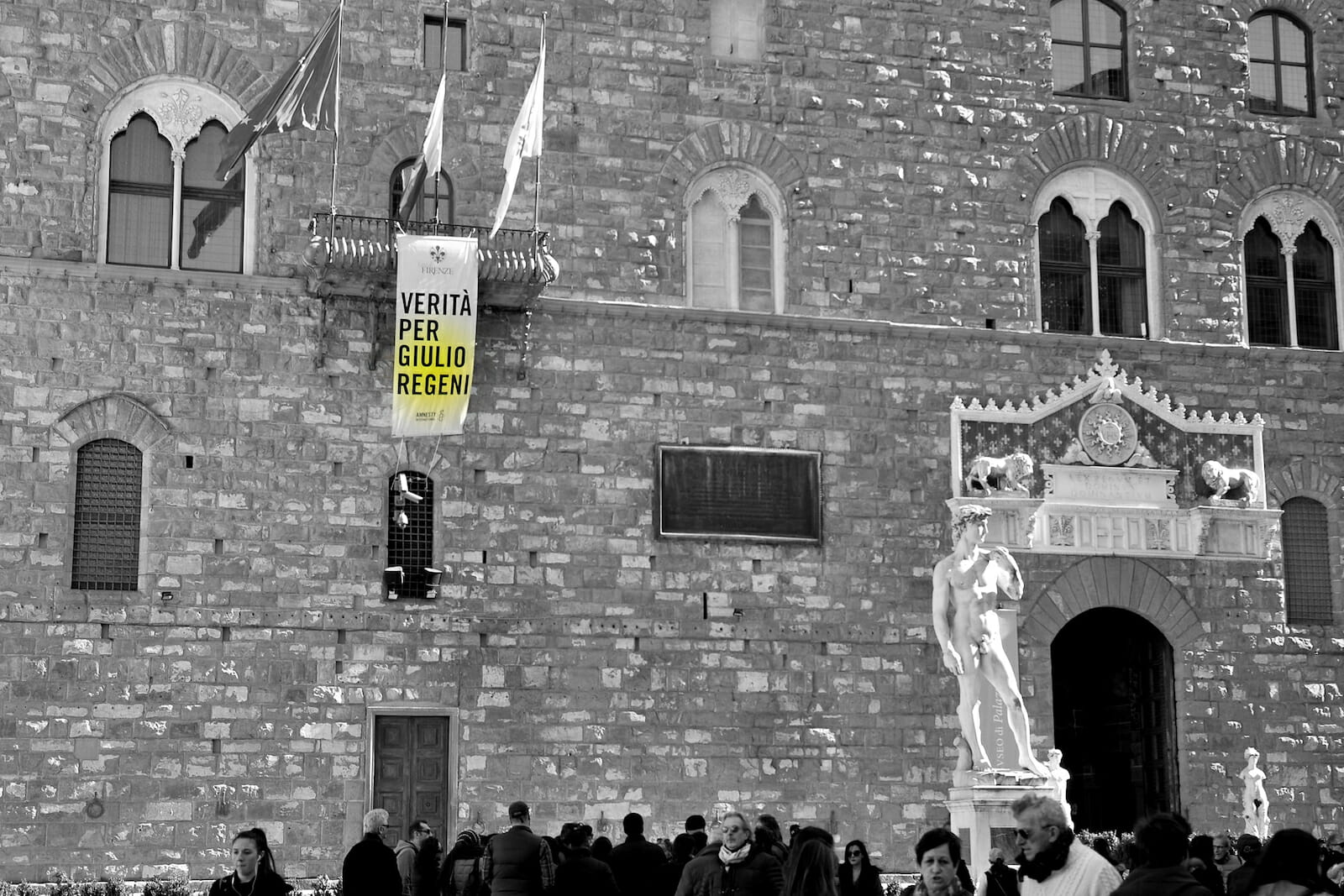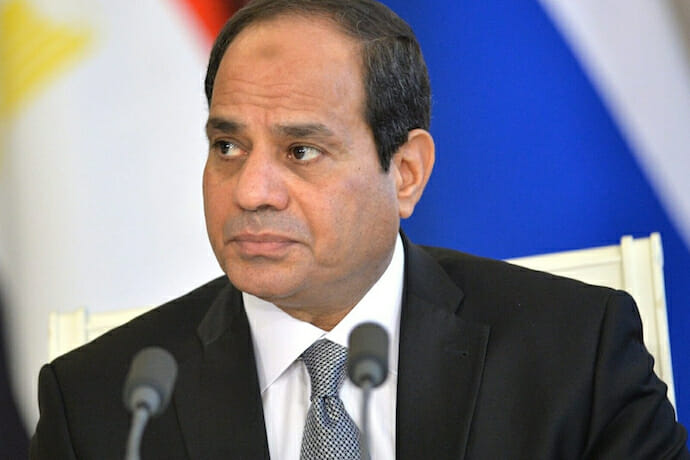
Giulio Regeni, Egypt, and the Nile Dam: Untangling His Murder
On January 25, 2016, my Italian compatriot, Giulio Regeni, was tortured to death in Egypt, just two weeks after my short trip to a silent, and heavily militarized Cairo. Regeni’s body was found a few days later in the outskirts of Cairo, by the side of the highway connecting Cairo with Alexandria, not far from a prison run by the Egyptian secret services. He showed evident signs of torture, including lacerations, signs of kicks and punches, various broken bones, including all fingers and toes. But also broken teeth, multiple non-fatal stab wounds, cuts, and a broken cervical vertebra that proved to be fatal. A horrifying death.
At the time, he was a 28-year-old Ph.D. student at Girton College in Cambridge and was doing field research on Egypt’s independent trade unions. His death sparked international indignation and a vivid political discussion that, in Italy, pushed the government to investigate in order to identify the perpetrators of this crime.
After Regeni’s body was found, initial reports from the Egyptian police first stated that Regeni was killed in a car accident, then that he was killed because of personal motives due to a homosexual relationship, and finally that he was killed by a criminal gang. These initial reports were all deemed ridiculous and inconclusive, even by the Egyptian public on social media. Regeni didn’t have homosexual relationships and his heavily tortured body evidenced the criminal inaccuracy of the early Egyptian investigators.
Italian investigators were initially promised full cooperation from Egyptian authorities and the police, but they soon lamented the inability of conducting proper questioning, as suspects or potential witnesses were only interrogated for a few minutes, and only after the Egyptian police had already questioned them for hours before. Also, telephone records from the area in which Regeni was killed were not given to Italian investigators, and video recordings were denied too.
Following mounting pressure, Egypt admitted that Regeni was under surveillance by the police before his disappearance, although police concluded he wasn’t considered a problem for national security. However, the involvement of the Egyptian secret services in Regeni’s death, and the indirect involvement of the Egyptian government, was increasingly evident for the media and the general public. In this climate, the Italian public increasingly demanded that politicians take strong actions against Egypt.
Cairo and Rome give conflicting statements in Giulio Regeni case #GiulioRegeni
— Alessandra Bonomolo (@alesbon) November 30, 2020
To further aggravate the role of Egypt in Regeni’s murder, in April 2016, Ahmed Abdallah was arrested on terrorism charges, charged with the possession of leaflets calling for violence and revolution. He was the president of an organization for human rights and freedoms in Egypt and the Egyptian consultant of the Regeni’s family. In September 2017, the Egyptian lawyer Ibrahim Metwaly, who was following the case for the family of Regeni, was arrested for allegedly attempting a coup against Egyptian President Abdel Fattah el-Sisi.
Sisi initially denied the involvement of the secret services in the brutal murder of Regeni. However, in light of mounting evidence, Sisi suggested that political opponents, still loyal to the Muslim Brotherhood that was toppled by Sisi himself, were likely the crime’s perpetrators. According to this narrative, these individuals, possibly from branches of the secret services, wanted the deterioration of the relations between Italy and Egypt, in order to cause troubles for Sisi’s government.
As of today, no major actions were taken by the Italian government against Sisi’s government, despite the national pressure to find the Verità per Regeni (“Truth for Regeni”).
What does not appear controversial, however, is Egypt’s evident involvement in the cruel murder, and its attempt to make it evident. I will soon explain why this is an attempt to make it evident, rather than an inability to hide the truth.
If the Muslim Brotherhood, and not the government, was behind the plot, then why were the initial police reports so evidently wrong? Why would Sisi’s government deny Italian investigators the opportunity to conduct a fair investigation and precisely reconstruct the events? Why should the investigators claim Regeni died in a car accident when his body was mutilated by evident signs of torture? It is clear that Egypt initially ‘covered up’ the murder of Regeni.
The question we should ask ourselves is therefore not who is the perpetrator, but rather why the crime was committed. According to Italian investigators, two possible scenarios explain why Regeni was killed. The first one is that he was thought to be a British spy by the Egyptian police and secret services. The second one is connected to his research project: as he was researching Egypt’s independent trade unions, he may have annoyed somebody important in the government. Indeed, Regeni had been writing articles about the difficult situation of the workers’ unions following the 2011 revolution that created the political background for Sisi’s military coup in 2013. Some of his articles were published under a pseudonym just a few days before his murder.
Is this really enough to explain such a cruel abomination? The world’s image of Egypt was not going to be any different, with or without a Ph.D. student’s report about the situation of workers under Sisi. Egypt’s international image was already compromised, and Regeni’s work could have been nothing more than a drop in the ocean.

Therefore, the question why, the true why is what matters the most – and I will try to shed some light on this obscure sequence of events. As mentioned above, the only consistent fact in this situation is Egypt’s attempt to show their criminal intent. We should start here. It was an attempt because there’s nothing else that can explain the actions taken by several Egyptian authorities at the time: declaring that he died in a car crash, that he had a homosexual relationship and was killed for it, that he was followed by police. But also, that his body was found dead not far away from the headquarters of the secret services, and the claim that political opponents connected to factions of the secret services were involved.
In all these events, Egypt never really seemed to be interested in hiding the truth, but rather to embarrass the Italian government’s inability to take action against Egypt, despite the evidence that its secret services were involved in the murder.
To further strengthen the hypothesis of the provocation, on the day Giulio’s naked and wounded body was found, Federica Guidi, the Italian minister for economic development, was in Egypt to conduct a diplomatic mission to discuss Italian investments in Egypt. Immediately after learning the fate of Regeni, she took a flight back to Rome. Possibly, a sign that for Egypt any business talk between the two countries was in need of a new distribution of power.
“The timing of this incident is intriguing and raises several questions. Why did it happen during the visit of the Italian minister of economic development to Egypt, where she headed an Italian business delegation? Why did it happen when bilateral relations gather unprecedented momentum both politically and economically? Are there any beneficiaries who seek to impede relations, given the turbulent situation in the region?” Sisi himself commented. The answer is Egypt itself, and we will now try to understand why.
Italy and Egypt are trade partners in the Mediterranean, with Italy being Egypt’s third-largest partner after the United States and China. Italy has made huge investments in Egypt, which are worth $2.6 billion.
In light of this, after Regeni’s case, Italy had a few available options at play to satisfy the mounting pressure to take action against Egypt, coming from both political actors and the Italian public. Italy could remove investment from Egypt, causing further economic troubles in Cairo, impose sanctions – with a similar effect, or ultimately go to war. The latter option was obviously not feasible, and not even remotely supported domestically and internationally. The first two options were utterly self-destructive for Italy, as it would cause economic downturns in Rome too. Also, strong actions would likely lead to increased immigration fluxes from North Africa, as Egypt remained a solid partner of Italy in the fight against illegal immigration. Finally, Italy would have left in Egypt a huge economic investment gap, which would have likely been filled by other European powers, first and foremost by France, whose interests in North Africa often collide with Rome’s.
Sisi’s government was fully aware of the fact that Italy would not respond with strong measures following Regeni’s death and understood it would go unpunished.
We understand, so far, that Egypt’s intentions were to provoke and embarrass Rome. Why would Egypt provoke Italy to this point, when Italy is such a reliable partner and the relations between the two states seemed strong and healthy? Sisi himself posed a similar question, as mentioned before. The answer lies in the question itself. It is not questionable that Italy has been one of Egypt’s major economic partners. What’s questionable, instead, is that Italy has been acting as a reliable economic partner for Egypt.
The quest for answers brings us to the Horn of Africa, where Italy’s colonial past has been replaced by large economic investment in the region. The most prominent involvement of Italian companies in the region is in Ethiopia’s gigantic Nile dam project, which has been termed the Grand Ethiopian Renaissance Dam (GERD). Once fully functional, the dam will be the largest hydroelectric plant in Africa and the 7th largest in the world. The plant is currently being built on the Blue Nile, which originates in Ethiopia and is one of the two major tributaries of the Nile. This river provides the largest amount of water to the Nile during the rainy season, with the river flowing north through Sudan and Egypt.
In 2011, the operations to build the gigantic dam started, despite Egypt’s opposition. Egypt feared that Ethiopia could use this power to restrict the river’s flow of water through Egyptian soil.
Interestingly, just one day after the dam project was revealed to the public, the Italian company Salini Costruttori was placed in charge of building it, a project whose costs are estimated at $4.8 billion. The plot begins to unfold.
Egypt’s issue with the Ethiopian dam has historical roots, in addition to the obvious economic ones. While Egypt was still under British influence, and Sudan a de facto British colony, the Anglo-Egyptian agreement of 1929 defined the share of Nile water between Egypt and Sudan, in great favor of Egypt, and without considering Ethiopia as well as other riparian states.
In 1952, Egypt took unilateral action and proposed the construction of the Aswan High Dam on Lake Nasser, whose waters are shared with Sudan. Newly independent Sudan rejected the plan and the 1929 agreement. As a consequence, and in a show of force, Egypt’s troops marched towards Sudan with the excuse of a border dispute. Egypt’s regional influence was strong at the time, and Cairo’s leadership sponsored a coup in Sudan, which led to the 1959 Agreement that divided the share of waters exclusively (again) between Egypt and Sudan.
Ethiopia, as it was not a party in the agreement, does not recognize its validity. In practice, Ethiopia believes they rightfully should have a share of the Nile waters, and have therefore unilaterally proceeded to build the gigantic dam, following the rejection of a new deal they initially proposed to the other involved parties. This action, however, is only unilateral in theory, as companies of several other countries are involved in the construction, first and foremost, Italy’s Salini Costruttori.
In 2010, Egyptian government sources indicated that the Italian government was funding the Ethiopian dam project. These rumors were spread far before Salini Costruttori was assigned with the task of building the dam – an assignment that was decided, given the timings of the operations, way earlier than March 31st, 2011. After these rumors became ground for political discussion in Egypt, in 2013, Maurizio Massari, the Italian ambassador to Egypt, denied the ties between Salini Costruttori and the Italian government and underlined that Egypt and Italy were fundamental economic and political partners. This was happening only days before Sisi’s coup d’état in July 2013.
Massari’s words exposed a contradictory logic from Italian authorities. If on the one end, he stressed the importance and the solidity of the relations between the two states, on the other hand, he also acknowledged that his government had no intention of preventing Salini Costruttori, nor any other Italian company, from finding fertile grounds in projects that pose a direct threat to the Egyptian economy. Italy was trying to get away with the excuse of neoliberalism.
This may work with other countries, but Egypt, with its political instability, was days from falling under the strong influence of Sisi’s military. And Sisi’s vision of the issue was going to be rather different than that of his predecessors. His early leadership was based on assertive authority and military power, and although he was backed by Egypt’s liberals, this indicated the emergence of a new, but old, neoliberal conservativism and despotic nationalism in the country. In other words, Sisi certainly had a difficult time digesting the interference, be it direct or indirect, of the Italian government in Egypt’s affairs. A reliable partner wouldn’t do that, and a response was needed – he must have thought.
Sisi’s government initially opted for a diplomatic approach, when Egypt’s foreign minister, Nabil Fahmy, asked both the European Union and Italy, in particular, to “invite Salini Costruttori to suspend the construction works at the GERD.” His Italian counterpart decided not to respond.
For Egypt, it was therefore clear that diplomatic responses were no longer an option on the table. The previous government’s complaints had been weak and inconclusive, perhaps even ridiculed by Massari and by the lack of interest from the highest governmental authorities in Italy, and the new government’s approach was largely ignored.
Until recently, Egypt has only occasionally complained directly about the governments whose businesses are involved in the construction of the dam. Therefore, concerns were not externalized at the political level, probably because the new Egyptian authorities knew they were not in the position to obtain much. At this point Egypt likely decided to play the revenge card, to rebalance the equilibrium of its relations with Italy.
The inaction and the embarrassment of Italian institutions despite the evidence is motivated by the aforementioned national interests, including trade relationships, the presence of large investments in Egypt, and agreements to fight illegal immigration and terrorism. Italy’s foreign minister, Di Maio, explained these points in a recent press conference to answer questions concerning possible actions by Italy against Egypt.
What Di Maio did not say, however, is why Italy keeps silent, and avoids loudly denouncing Sisi and his government. Even if the public opinion in Italy could potentially be supportive of sanctions against Egypt, the same public opinion could soon turn against the government, when, due to retaliation, Italy’s businesses would likely be forced to leave Egypt, or would be limited in their action. This would in turn cause further economic troubles, the loss of jobs and competitiveness abroad, and ultimately even a rise in the price of gasoline or other goods. Very few would intimately comprehend the connection between these events.
In this complicated scenario, Giulio Regeni was likely a man with the wrong interests, in the wrong place, at the wrong time. In the light of Egypt’s military rule, he was a strategic target they had to sacrifice, in order to regain traction in the geopolitical tug-of-war with Italy and prevent Italy from interfering with Egypt’s interests in the future.
Giulio Regeni was the victim of an international game of power, in which Egypt and Italy both played a part.
The criminal mutilation of Regeni’s body, and the pain suffered by his family and friends, will soon be forgotten, in Italy and elsewhere. And the direct and indirect perpetrators of the crime will go unpunished. Though, as Egypt has a recent history of revolutions, even this government might eventually fall. The silence and the embarrassment of Italian institutions, though, won’t be replaced.
